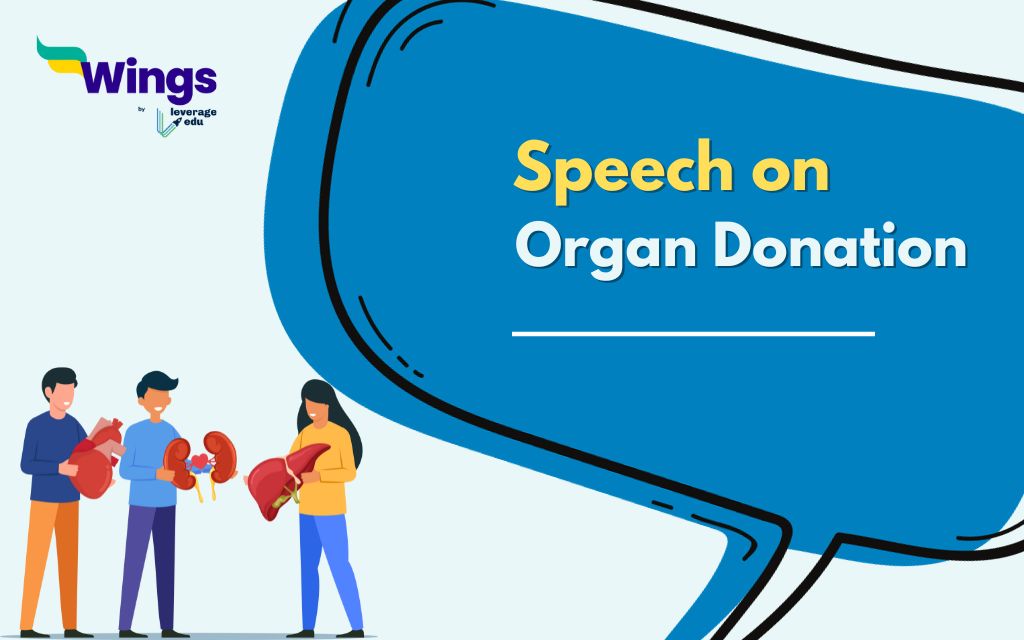Speech on Organ Donation: It is said that donations never go to waste, but what do you think if someone asks you to donate your body organs? Can you take the call the same way as you take any other call?
You will be surprised to know that each potential donor can save up to eight lives for whoever needs organs. Also, as per the Global Observatory on Donation Transplantation, the donation rate in India surged from 0.05 per 10 lakh people to 0.08 per 10 lakh people in the preceding years.
Also Read: Organ Donation Day: Date, Theme, Importance, and More
5 Minute Speech on Organ Donation
Greetings to all the teachers and students gathered here. Today, I stand before you to deliver a speech on organ donation. In this speech, we will dive into the noble cause of organ donation, which can save not only lives but increase compassion among humans.
Organ donation refers to a legal process through which people with healthy body organs can donate to individuals suffering from organ failure. One who gives organs is known as the ‘organ donor’. Whereas, the one receiving it is known as the ‘organ recipient/receiver’. An organ donor needs to consent before giving an organ. This rule applies to adults. As for minors, parents need to give their consent.
Now that we are thorough with the basics of organ donation, let me introduce you to the organs that can be donated and transplanted in India. As per the Transplantation of Human Organs Act (THOA) 1994, an organ donor in India can donate or transplant 6 organs. These organs are kidney, liver, heart, lungs, pancreas, and intestine. Also, the law allows us to donate heart valves, skin, corneas, ligaments, bones, etc. Further, the legislation also permits tissue donation in India.
Hereon, let us know about different types of organ donations. There are two types of organ donations Living Organ Donations and Deceased Organ Donations. Living Organ Donation is the donation and transplant of a healthy organ from a living person to an individual suffering from organ failure. On the other hand, a donation done either after the death of the person or from a brain-dead person is known as Deceased Organ Donation.
There are many misconceptions related to organ donation. Some myths are body mutilates due to organ and tissue donation, anyone can be an organ donor, and one can only donate the heart, liver and kidneys. To overcome such misconceptions, we should research the types and concepts of organ donation. We should also learn about parts of bodies which are donatable and the rules governing organ donation.
Beyond the sphere of education, there remains a lack of awareness regarding the process of donating body organs. People still don´t know that they can register themselves as organ donors through official channels such as doe nor registries, driver´s licence offices, or some online platforms such as the National Organ and Tissue Transplant Organisation (NOTTO), Organ India, Online Transplant Registry, and Gift Your Organ Foundation.
Also as students, we can raise awareness through the planning and execution of on-campus awareness campaigns, social media campaigns, and partnerships with local or national medical organisations. By associating with such organisations, students can bring experts, volunteers, and medical professionals to campus events. Also, parents can recommend to schools to incorporate organ donation into the curriculum. Further, schools can organise workshops and create clubs to teach students about organ donation.
Therefore, as students, we can reshape society’s perspective on this important issue. We can try to talk to and influence people around us. We need to make them understand the need for organ donation by dispelling all myths and misconceptions around it. This will certainly help in creating a society that values compassion, empathy, and the importance of life.
Also Read: How to Become a Stem Cell Therapist?
10 Lines Speech on Organ Donation
Let us understand donating organs in simple 10 lines:
- Organ donation is a generous act that offers a gift of precious life to whoever is facing a life-threatening condition.
- A shortage of organs helps highlight the transplantation of body organs and turns the individual into an organ donor.
- One donor can save multiple lives by donating various organs and tissues.
- If one wants to donate an organ, then one just needs to register themselves as an organ donor with the relevant authorities.
- It is important to spread awareness about organ donation and remove all myths from society.
- One’s decision to become an organ donor helps bring about social, cultural, and religious changes.
- Organ donors help give a social message to society through selfless acts.
- Students can help generate awareness about the organisation through on-campus awareness campaigns, social media platforms, and partnerships with organizations.
- Academic institutions can include organ donation as a subject in their curricula to help raise awareness about organ donation.
- As an organ donor, one can help build a community and share the responsibility for the well-being of others.
Also Read: 160+ Best & Easy English Speech Topics for Students
FAQs
Ans. Organ donation provides life to individuals who need it. It improves their quality of life and overall health.
Ans. The idea behind organ donation is to give people a chance to live a healthier life by transplanting organs from willing donors.
Ans. A common slogan for organ donation is, ¨Recycle Life, Be An Organ Donor.¨
Related Blogs
For more information on such interesting speech topics for your school, visit our speech writing page and follow Leverage Edu.


 One app for all your study abroad needs
One app for all your study abroad needs












 60,000+ students trusted us with their dreams. Take the first step today!
60,000+ students trusted us with their dreams. Take the first step today!